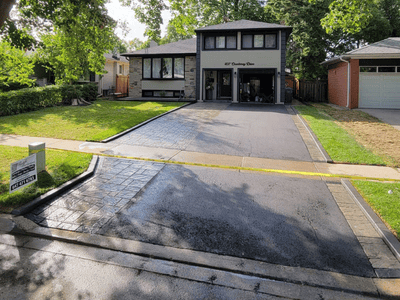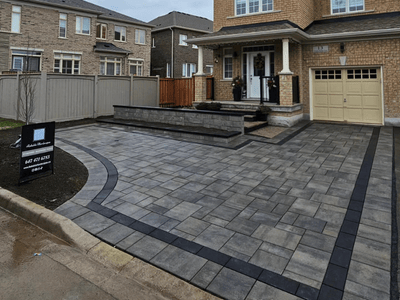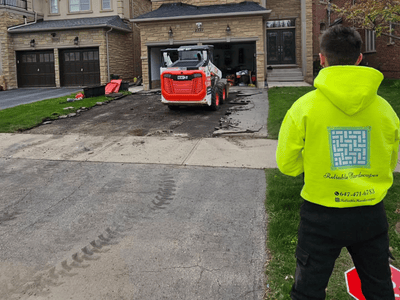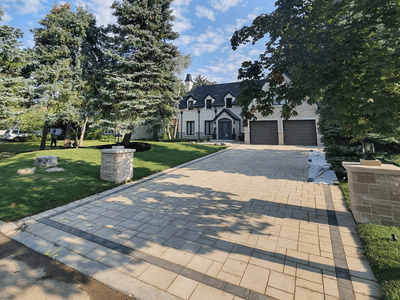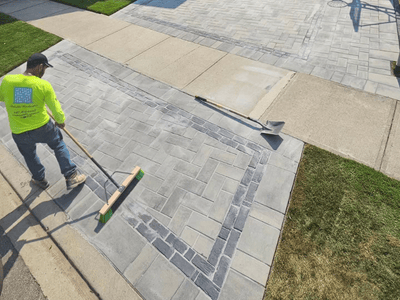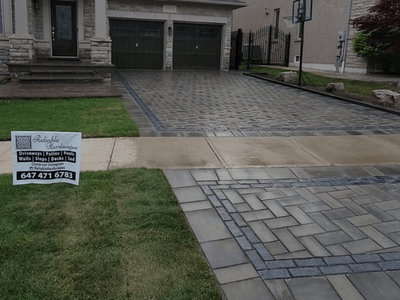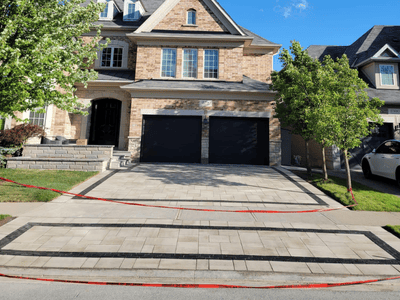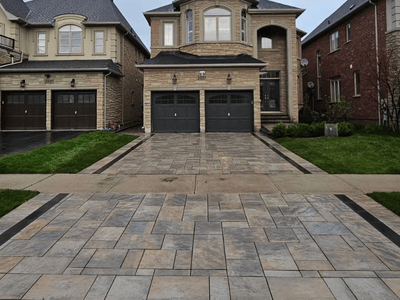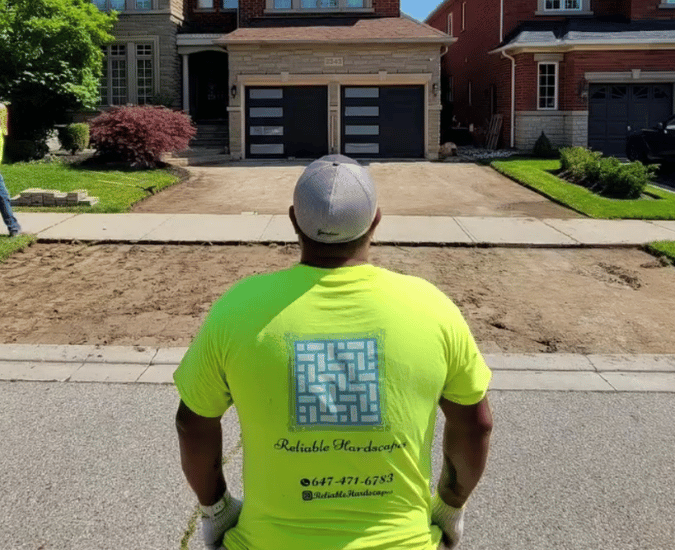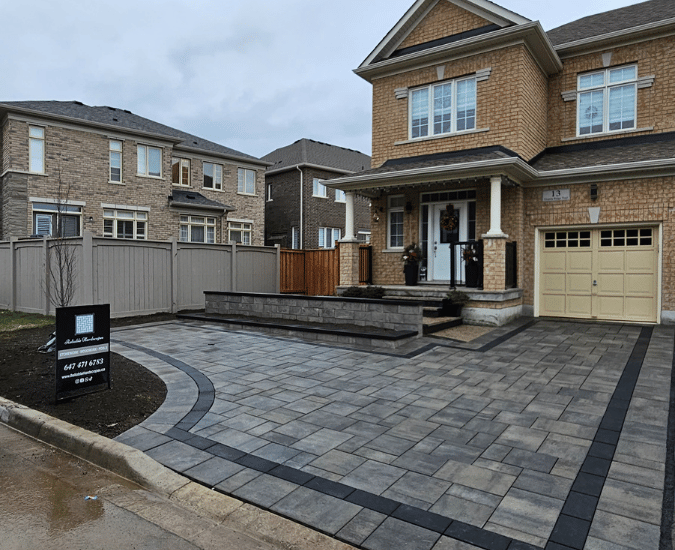Keep Your Driveway Looking Flawless: The Ultimate Guide to Interlocking Driveway Repair & Maintenance in Mississauga
An interlocking driveway can do wonders for your home’s curb appeal and overall value. Whether you're thinking about a brand-new installation or maintaining your existing one, keeping it in top shape is a long-term investment. With the right care, your interlocking driveway can last decades, looking fresh and standing strong against the elements. But, like any feature exposed to daily wear and tear, your driveway will need some attention from time to time.
This guide will help you navigate the ins and outs of interlocking driveway repair and maintenance. From simple fixes to regular upkeep, we’ve got you covered.
Why Interlocking Driveway Maintenance Matters
Your driveway takes a beating every day. From the weight of your vehicles to the impact of weather conditions, there are many forces at play. Without regular maintenance, you’ll soon notice signs of wear—like cracked pavers, shifting stones, or even weeds pushing through the joints. The good news? Regular maintenance and timely repairs can drastically extend the life of your driveway, ensuring it stays functional and beautiful for years.
An interlocking driveway is designed for durability, but it still requires care. Think of it like taking care of a high-performance car—routine checks, a little cleaning, and occasional adjustments will keep it running smoothly for the long haul.
Common Issues with Interlocking Driveways
Understanding the issues that may arise with your interlocking driveway will help you catch problems early before they get out of hand. Here’s a rundown of the most common problems:
Weeds & Moss Growth: Weeds can sneak their way through the joints between your pavers, spoiling the appearance of your driveway. Left unchecked, they can also shift the pavers, creating uneven spots.
Shifting or Sinking Pavers: Over time, your pavers can shift or sink due to settling or improper installation. This may create a bumpy, uneven surface.
Cracks & Chips: The natural pressure from vehicles, combined with weather fluctuations, can lead to cracks or chips in your pavers. Though these may start small, they can expand over time if not addressed.
Discoloration: Exposure to the elements can cause your driveway to lose its vibrant color. Sunlight, rain, snow, and even the oils from your car can take their toll on the appearance of your driveway.
Water Pooling: Improper drainage or uneven installation can cause water to pool on your driveway, leading to erosion or staining. This not only looks bad but can also create safety hazards.
Loose or Hollow Pavers: Pavers that have settled improperly can become loose, or worse, create hollow spots when stepped on. This can cause instability and make the surface unsafe to walk or drive on.
Essential Interlocking Driveway Maintenance Tips
The best way to keep your interlocking driveway looking great and functioning smoothly is through regular maintenance. Here are some practical tips to help you stay on top of things:
Clean Regularly: Sweep debris off your driveway regularly to prevent dirt buildup. For tougher stains, use a pressure washer to clean the surface and remove grime. Regular cleaning prevents wear and tear and ensures your driveway stays pristine.
Resand Your Driveway: Over time, the sand that holds the pavers in place will wear away. Adding fresh sand helps lock the pavers into position and prevents weeds from growing. You can even use polymeric sand, which hardens when wet, to make the joints more stable and reduce weed growth.
Address Weeds & Moss: Weeds can quickly disrupt the smooth surface of your interlocking driveway. Use a weed remover tool or pull them by hand, ensuring you remove their roots. Consider using a weed inhibitor between the joints for longer-term prevention.
Seal Your Driveway: Sealing your driveway every couple of years protects the pavers from stains, moisture, and UV rays, which can cause fading. A high-quality sealer will also prevent weed growth and keep the surface smooth.
Inspect Regularly: Check your driveway for shifting pavers, cracks, or other damage. Early detection allows you to address issues before they worsen and become more expensive to fix.
When to Repair Your Interlocking Driveway
Even with the best care, issues can arise. Here's when to consider repairs for your driveway:
Shifting or Uneven Pavers: If your driveway has noticeable low spots or uneven pavers, you should repair it as soon as possible. If left unchecked, the problem can worsen over time, causing more damage and potentially leading to a more expensive fix.
Cracks & Chips: Small cracks and chips may not seem like a big deal, but they can spread over time if not repaired. For minor cracks, you can patch them up yourself with specialized fillers. Larger cracks or structural issues may require professional intervention.
Water Pooling: Poor drainage can lead to water pooling on your driveway, causing damage to the surface and compromising the integrity of the pavers. If you notice pooling water, it’s time to adjust the grading or add drainage solutions.
Loose or Hollow Pavers: If pavers have become loose or you notice a hollow sound underfoot, it’s a sign that something is wrong. Either the paver has shifted, or the base material underneath has settled. Address this promptly to avoid more significant issues.
How to Repair Your Interlocking Driveway
While some minor fixes can be handled by homeowners, others require professional attention. Here’s a step-by-step guide for repairing common issues:
Fixing Sunken or Uneven Pavers:
- Start by lifting the sunken pavers.
- Check the base material underneath for any settling or damage.
- Add new base material, like crushed stone, to level the area.
- Replace the pavers and compact them firmly.
- Resand the joints to keep the pavers in place.
Repairing Cracks & Chips:
- Clean the crack thoroughly.
- Use a concrete filler or paver-specific repair compound to fill the crack.
- Smooth the surface with a putty knife.
- Let the compound cure before using the driveway.
Fixing Drainage Problems:
- Assess the slope of your driveway to ensure water is flowing away from the house.
- Install French drains or other drainage solutions to direct water away from the surface.
Sealing Your Pavers: After making repairs, seal the driveway to protect the pavers from moisture and stains.
When to Call a Professional for Repairs
Sometimes, a professional is necessary to tackle more complex repairs. Here’s when it’s best to call in an expert:
Extensive Shifting or Sinking: If your driveway has large sunken or uneven sections, a professional can assess the base material and ensure that it is correctly leveled.
Severe Cracking: If the cracks are widespread and affect the structural integrity of your driveway, it’s best to get professional help.
Major Drainage Issues: If water is pooling in multiple areas, it might be necessary to regrade the driveway and install proper drainage systems, which is best left to experts.
Conclusion
Your interlocking driveway adds value and curb appeal to your home, but it needs regular maintenance to keep it looking great. Simple upkeep like cleaning, sealing, and addressing small issues can prolong its lifespan and save you money on expensive repairs down the road. If you encounter more significant problems or are unsure of how to handle them, don’t hesitate to call in a professional. With the right care, your driveway will continue to shine for years to come.



